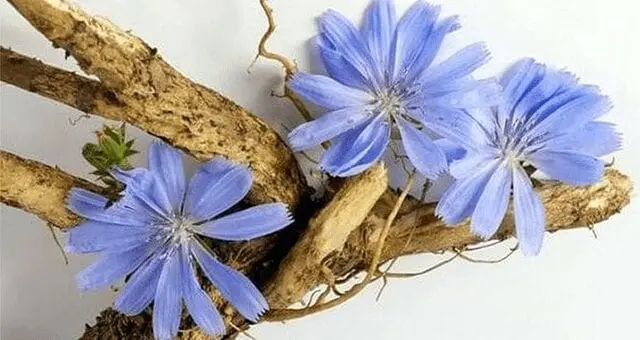Contents
Description
Often, bright blue flowers of chicory growing in the form of a weed can be found in meadows, arable lands, wastelands, roadsides of our country. But this useful plant is also a common sowing crop in Western Europe, Indonesia, India, and the USA.
Nowadays, chicory is very popular in many countries of the world as a delicious seasoning and healthy product in dietary nutrition. Coffee with the addition of ground roasted chicory root has long been one of the favorite drinks of Europeans.
And a drink prepared on the basis of pure cyclone root with the addition of milk or cream, as the most useful coffee substitute, is often included in the diet of both children and pregnant women, and people for whom coffee is contraindicated for health reasons.

The Belgians bake chicory with cheese or apples; Latvians often prepare a cold drink from the cykor root with the addition of honey, lemon and apple juice.
Chicory history
People call chicory “Peter’s batog”, “sentinel guard” and “bride of the sun”. According to legend, the Apostle Peter, when he led sheep to pasture, used chicory instead of twigs in order to manage the flock.
But there is another legend. Allegedly, the Apostle Peter took chicory and drove this herb of harmful insects from the ears of grain. After – he threw her to the side of the road. Since then, chicory grows on the road.
Chicory is one of the oldest known plants. Most of all it is grown in North Africa, Western Asia and Europe. The very process of consuming and brewing chicory was first mentioned in the annals of Egypt. Later, chicory began to be cultivated by medieval monks in Europe. It was only in 1700 that it was brought to North America, where it became the most common coffee substitute.

Composition and calorie content
Chicory root contains up to 60% inulin, 10-20% fructose, glycosidintibin (used in the pharmaceutical industry), as well as carotene, B vitamins (B1, B2, B3), vitamin C, macro- and microelements (Na, K, Ca, Mg, P, Fe, etc.), organic acids, tannins, pectin, protein substances, resins.
The most valuable component in the composition of the tsikor root is inulin, a substance that improves metabolism and normalizes the digestive system.
- Proteins 0 g
- Fat 0 g
- Carbohydrates 2.04 g
- Caloric content 8.64 kcal (36 kJ)
The benefits of chicory

The benefits of chicory are hidden in its root, which contains up to 75% inulin (organic matter). It is a natural polysaccharide that is suitable for dietetic nutrition (diabetes). Inulin is easily absorbed and becomes a powerful prebiotic.
When consumed regularly, chicory increases the body’s defenses against harmful bacteria and viruses.
Chicory is also a storehouse of vitamins. Beta-carotene – a natural antioxidant – removes free radicals, prevents the development of oncology. Vitamin E – slows down the aging process, prevents blood clots and improves the functioning of the immune system.
Thiamine is responsible for endurance and the functioning of the nervous system. Choline helps cleanse the liver of excess fat. Ascorbic acid fights viruses and colds. Pyridoxine relieves stress and fatigue, improves metabolism and lowers blood sugar.
Riboflavin regulates cell activity and affects reproductive functions. Folic acid – participates in the synthesis of DNA and amino acids, supports the work of the cardiovascular and immune systems.
Chicory harm
Chicory is not recommended for people with varicose veins and cholelithiasis. Also, chicory can cause individual intolerance and allergic reactions.
Since chicory dilates blood vessels and “accelerates” the blood, it is better for people with hypotension not to abuse the drink. One cup of chicory can cause nausea, weakness, and dizziness.
The daily allowance for a healthy person is 30 milliliters of drink per day.
Application in medicine

Chicory on an empty stomach dulls hunger, reduces appetite, so doctors recommend drinking it with a balanced diet. Also, the drink relaxes the nerves and fights insomnia. It removes toxins from the body, normalizes blood sugar levels.
On the one hand, chicory has a tonic effect on the body. On the other hand, it has a calming effect. Therefore, it helps to concentrate and feel normal. Chicory relaxes the nervous system. It also contains a fairly large amount of inulin, which maintains normal blood glucose levels.
Therefore, chicory is very often used as a sugar reducing agent in type 2 diabetes. Chicory has anti-inflammatory properties. It regulates the activity of the thyroid gland well. It also helps to digest food, especially fats. It contains choline, many B vitamins, manganese, potassium and calcium.
In modern medicine, chicory finds a very diverse application due to the mass of its beneficial medicinal properties (sedative, sugar-reducing, astringent, choleretic, diuretic, anti-inflammatory, antipyretic, antihelminthic properties).
The benefits of chicory are obvious for the digestive system as well. A decoction of chicory roots has always been considered one of the best means to improve appetite, to normalize the work of the pancreas. In addition, chicory helps dissolve gallstones, has a choleretic effect and enhances blood flow and metabolic processes in the liver.
Inulin derived from chicory is a bifidostimulant, i.e. promotes the development of beneficial intestinal microflora, which strengthens the general immunity of the body. The substances contained in chicory also help to weaken the inflammatory process of the mucous membrane of the stomach and intestines.
In connection with the above properties, chicory is widely used in the prevention and treatment of stomach and duodenal ulcers, gastritis, dysbiosis, dyspepsia, constipation, liver and gallbladder diseases (cirrhosis, hepatitis, cholelithiasis, etc.).
Chicory for diabetes

In medicine, cyclic root is most valued for its high content of the high molecular weight polysaccharide inulin. It is inulin that helps to lower blood sugar levels, improve metabolism and digestion, and all of these properties in a complex play a positive role in the prevention and treatment of diabetes and are effective in the fight against excess weight.
Chicory is also used in the complex treatment of skin diseases. Due to its bactericidal and anti-inflammatory properties, chicory can be successfully used as a wound healing agent (infusions, decoctions and alcoholic tinctures of the roots of this plant are effective in the treatment of seborrhea, allergic dermatitis, neurodermatitis, diathesis, eczema, chickenpox, psoriasis, vitiligo, acne, furunculosis, etc. )
The use of chicory in the diet can bring a tangible positive effect in the treatment of diseases of the spleen, inflammatory diseases of the kidneys, and kidney stones. In addition, regular consumption of chicory will help a person cleanse his body of toxins, toxins, radioactive substances and heavy metals.
Contraindications
Patients suffering from vascular diseases, as well as varicose veins or hemorrhoids, should consult a doctor before using chicory products in their diet.









